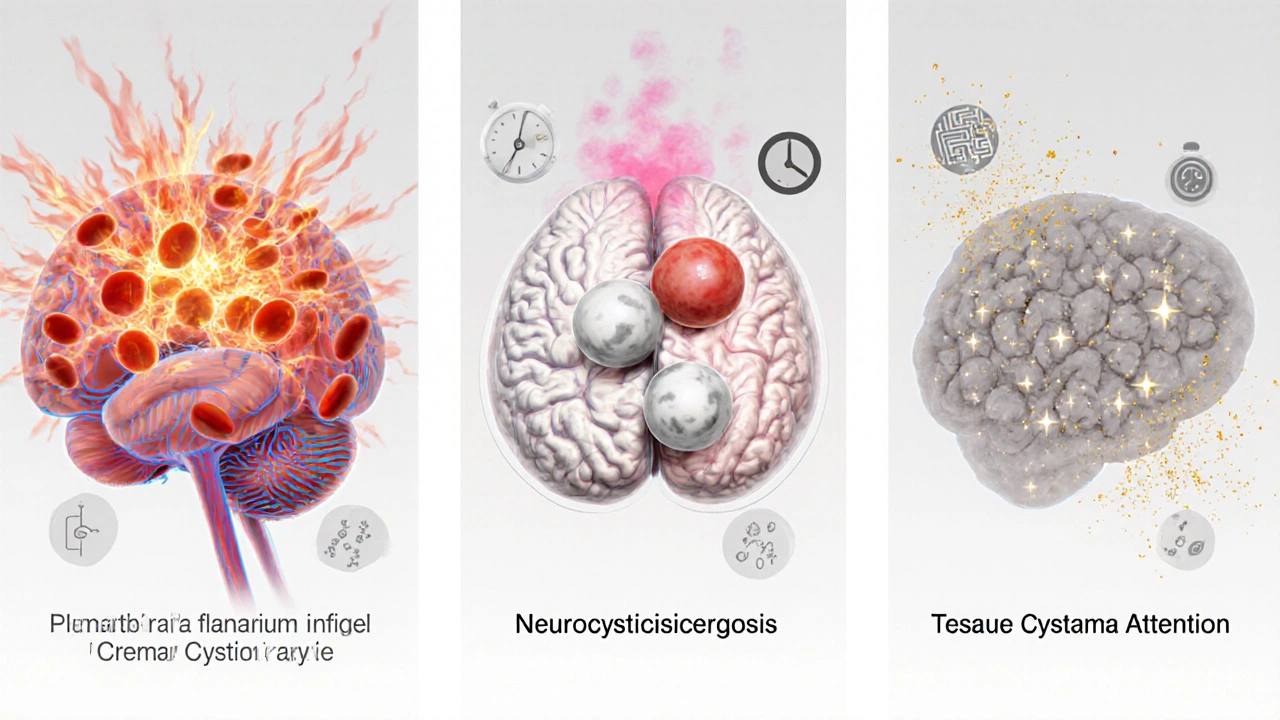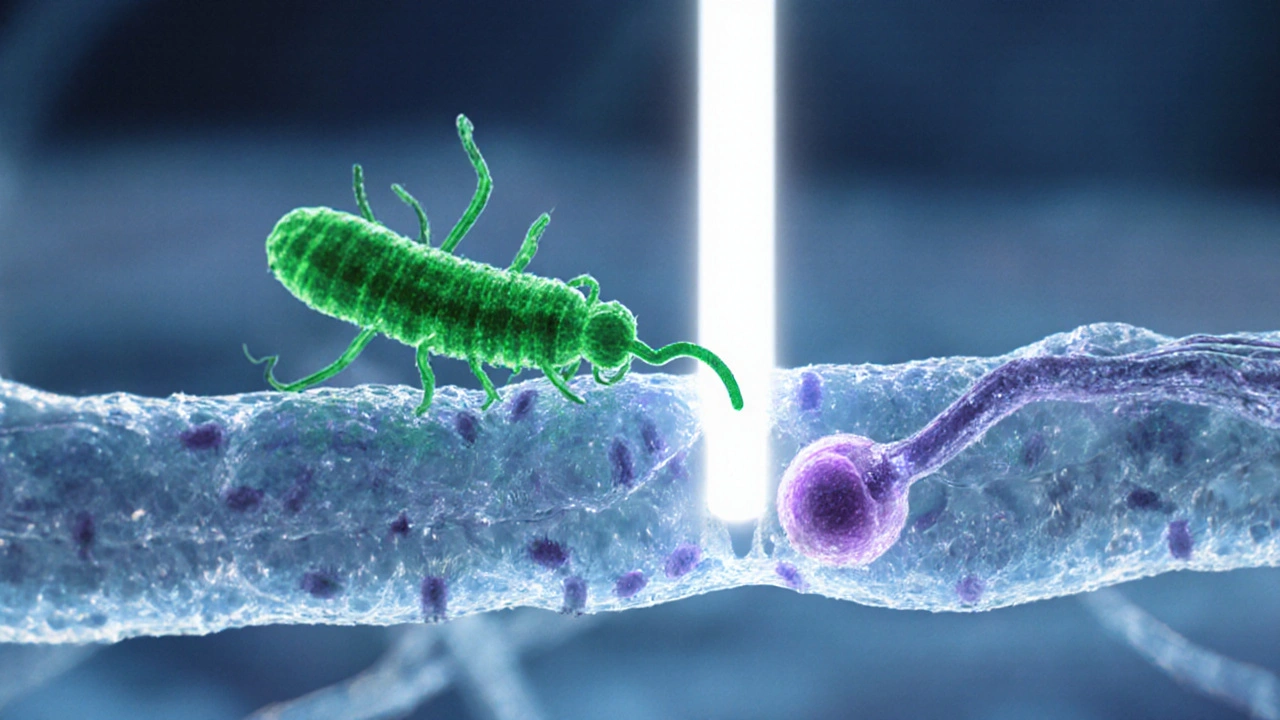Key Takeaways
- Certain parasites can impair memory, attention, and reaction time even without obvious illness.
- Mechanisms include inflammation, disruption of the blood‑brain barrier, and direct parasite invasion.
- Major culprits are Toxoplasma gondii (a protozoan that forms tissue cysts in the brain), Plasmodium falciparum (the malaria parasite that can cause cerebral malaria), and Neurocysticercosis (larval cysts of the pork tapeworm in the CNS).
- Neuroinflammation and altered neurotransmitter balance are the common pathways linking infection to reduced mental performance.
- Early detection, antiparasitic therapy, and supportive cognitive rehabilitation can restore function in many cases.
How parasitic infections Reach the Brain
When a parasite breaches the bloodstream, it faces two major hurdles before it can affect cognition: crossing the blood‑brain barrier (a tightly regulated endothelial wall that protects neural tissue) and evading the host’s immune surveillance. Some species, like Toxoplasma gondii, already have a built‑in strategy to form dormant cysts inside neurons, allowing them to hide for years. Others, such as Plasmodium falciparum, trigger severe inflammation that temporarily opens the barrier, leading to cerebral malaria.
Once inside the CNS, parasites can directly damage neurons, disrupt synaptic signaling, or provoke a chronic immune response (activation of microglia, cytokine release, and recruitment of leukocytes). The resulting neuroinflammation often outlasts the infection itself, leaving a lingering cognitive footprint.
Major Parasites and Their Cognitive Signatures
Not every parasite produces noticeable mental changes, but a handful have robust evidence linking them to neurocognitive impairment.
| Parasite | Typical Cognitive Deficits | Primary Mechanism | Prevalence in Endemic Areas |
|---|---|---|---|
| Toxoplasma gondii | Slower reaction time, impaired novelty seeking, subtle memory dips | Embedded tissue cysts alter dopamine pathways | ~30% of adults in some Latin American countries |
| Plasmodium falciparum | Severe attention loss, working‑memory failure, post‑malaria cognitive syndrome | Sequestration in brain microvasculature + cytokine storm | High in sub‑Saharan Africa during transmission season |
| Neurocysticercosis | Epileptic seizures, long‑term memory issues, executive dysfunction | Space‑occupying cysts causing local inflammation | Leading cause of adult epilepsy in Latin America and parts of Asia |
| Schistosoma mansoni | Reduced processing speed, impaired school performance in children | Egg‑induced granulomas near spinal cord and brain | Endemic in East Africa and Brazil |
| Trypanosoma brucei | Progressive dementia, sleep cycle disruption (sleep/wake inversion) | Direct neuronal invasion, chronic inflammation | Rare, confined to subsaharan regions (sleeping‑sickness foci) |
These five parasites illustrate the range of ways a pathogen can sap mental performance-from subtle mood shifts to full blown dementia.
Biological Pathways Linking Infection to Cognitive Decline
Three overlapping pathways dominate the scientific literature:
- Neuroinflammation: Cytokines such as IL‑1β, TNF‑α, and IFN‑γ activate microglia, which then release reactive oxygen species (ROS). The oxidative burst damages dendritic spines and hampers synaptic plasticity.
- Neurotransmitter Dysregulation: Some parasites manipulate host neurotransmitters to aid their own survival. Toxoplasma gondii increases dopamine storage, affecting risk‑taking behavior and working memory.
- Structural Damage: Cysts, hemorrhages, or edema physically compress brain regions. In neurocysticercosis, calcified lesions in the hippocampus correlate with episodic memory loss.
Because these mechanisms are not mutually exclusive, a single infection often triggers a cascade that magnifies the cognitive hit.

Detecting Cognitive Impact: Tools and Tests
Clinicians combine parasitological diagnostics with neuropsychological assessments. Standard stool ova‑and‑parasite (O&P) exams or serology confirm infection, while tools like the Mini‑Mental State Examination (MMSE), Trail Making Test, and computerized reaction‑time batteries reveal functional deficits.
Advanced imaging-MRI with fluid‑attenuated inversion recovery (FLAIR) sequences-can spot cysts or cerebral edema. Functional MRI (fMRI) studies have even shown altered activation patterns in the prefrontal cortex of Toxoplasma gondii-positive individuals during working‑memory tasks.
When a cognitive decline appears out of proportion to the acute illness, a “brain‑infection work‑up” should include:
- Serologic panel for common neurotropic parasites.
- Blood PCR for rapid detection of parasite DNA.
- Neuroimaging to exclude structural lesions.
- Baseline neuropsychological testing for longitudinal follow‑up.
Treatment, Rehabilitation, and Prevention
Effective therapy hinges on early parasite clearance. Albendazole or praziquantel treat most helminths, while pyrimethamine‑sulfadiazine combos target Toxoplasma gondii. Artemisinin‑based regimens remain first‑line for severe malaria, but adjunctive steroids are often required to blunt cerebral inflammation.
Antiparasitic drugs alone rarely reverse cognitive deficits if neuroinflammation has become chronic. Cognitive rehabilitation-targeted memory exercises, attention‑training apps, and occupational therapy-can help reclaim function. A 2023 randomized trial in Brazil showed that a 12‑week memory‑training program improved MMSE scores by 2.5 points in patients recovering from neurocysticercosis.
Prevention stays the most cost‑effective strategy:
- Food safety: Cook meat to appropriate temperatures to kill tissue cysts.
- Hygiene: Hand‑washing after soil contact reduces soil‑borne helminth exposure.
- Vector control: Mosquito netting and indoor residual spraying lower malaria risk.
- Pet management: Proper cat litter handling cuts down Toxoplasma transmission.
Public‑health campaigns that combine education with access to clean water and deworming medication have cut the prevalence of cognitive‑impacting parasites by up to 40% in some endemic regions.
Future Directions and Research Gaps
Despite growing awareness, several questions linger:
- How do subclinical infections alter the developing brain in children?
- Can anti‑inflammatory agents administered during acute infection prevent long‑term neurocognitive sequelae?
- What is the role of the gut‑brain axis in mediating parasite‑induced mood changes?
Large‑scale longitudinal cohorts, especially in low‑resource settings, are essential to untangle these threads. Meanwhile, integrating cognitive screening into routine parasitic disease management could catch deficits early and direct patients to appropriate rehabilitation.
Frequently Asked Questions
Can a mild parasitic infection still affect my brain?
Yes. Even low‑grade infections can trigger chronic inflammation that subtly impairs memory or reaction time, especially in children whose brains are still developing.
How long does it take for cognition to improve after treatment?
Recovery varies. Some patients notice better focus within weeks, while others need months of rehab to regain full function. Persistent inflammation can lengthen the timeline.
Is there a quick test to see if parasites are harming my brain?
A combination of blood PCR for parasite DNA and a brief neuropsychological screen (e.g., MoCA) offers a fast way to flag potential issues.
Do pets increase the risk of cognitive problems?
Cats can shed Toxoplasma gondii oocysts in their litter. Proper litter hygiene and keeping cats indoors reduces human exposure.
Are there long‑term social consequences of parasite‑related cognitive loss?
Reduced academic performance, lower productivity, and increased risk of mental‑health disorders are documented outcomes, especially in low‑income communities where infections are common.

Parasites that mess with our brains are a betrayal of nature we cannot tolerate. We must protect our citizens from any foreign invader that threatens cognitive freedom
The article does a solid job outlining how inflammation drives the cognitive decline. Good to see the mechanisms broken down without unnecessary jargon
Great summary! If you catch the infection early the brain can bounce back with rehab and proper meds. Keep spreading the word so folks get tested sooner
While the exposition is commendably exhaustive, the author neglects to interrogate the epistemic underpinnings of neuroparasitology. A more nuanced dialectic would juxtapose molecular pathogenesis with sociocultural determinants of exposure, thereby transcending mere clinical enumeration
Wow this is intense 😱 the brain‑hacking parasites sound like sci‑fi villains! We must defend our nation’s health and ensure no one falls prey to these microscopic saboteurs 🙌
Thanks for the thorough overview. For anyone dealing with a diagnosis, remember that therapy combined with cognitive exercises often yields noticeable improvement. Stay hopeful and keep the follow‑ups regular
Ever wondered why the powers that be never talk about hidden parasites shaping our thoughts? Maybe they've got a reason to keep us in the dark. The article scratches the surface but leaves out the deeper agenda that could explain the subtle mood shifts we feel daily
Dude this is crazy how tiny bugs can mess up your brain. Seriously, who thought a worm could turn you into a slowpoke? Gotta keep an eye on water and food, otherwise you’re just asking for trouble
Sure, because we all have time to worry about brain parasites while Netflix is waiting.
It is noteworthy that the literature on neuroparasitic infections often compartmentalizes clinical manifestations without due regard for the broader neurodevelopmental context, particularly in pediatric populations where the consequences of subclinical infections may manifest as subtle deficits in learning trajectory. Moreover, the inflammatory cascade elicited by parasites such as Toxoplasma gondii or Plasmodium falciparum does not merely transiently elevate cytokine levels; it can engender a chronic microglial activation state that reshapes synaptic architecture over prolonged periods. This persistent neuroinflammatory milieu may interfere with long‑term potentiation, a cellular correlate of memory consolidation, thereby compromising cognitive reserve. In addition, the dopaminergic perturbations induced by Toxoplasma have been linked to altered risk‑taking behavior, a factor that extends beyond pure cognition into socio‑behavioral domains. From a therapeutic standpoint, while antiparasitic regimens are indispensable for parasite clearance, adjunctive strategies targeting neuroinflammation-such as NSAIDs or cytokine modulators-remain underexplored in clinical trials. The integration of neuroimaging biomarkers, for instance diffusion tensor imaging metrics, could furnish objective indices of white‑matter integrity post‑infection and guide personalized rehabilitation protocols. Furthermore, consideration of the gut‑brain axis reveals that intestinal dysbiosis secondary to helminthic infections may indirectly modulate neurochemical pathways, an avenue ripe for investigation. Public‑health initiatives that combine deworming campaigns with school‑based cognitive screening could yield dual benefits, curtailing infection rates while identifying children at risk for academic underperformance. It is also imperative to acknowledge socioeconomic determinants; communities burdened by poverty often lack access to clean water and sanitation, thereby perpetuating transmission cycles. Consequently, interdisciplinary collaborations among neurologists, infectious disease specialists, and social scientists are essential to devise comprehensive intervention frameworks. Finally, longitudinal cohort studies that follow individuals from exposure through adulthood are needed to delineate the true trajectory of parasite‑induced cognitive decline and to assess the durability of rehabilitative gains over the lifespan.
Dear readers, I wish to commend the authors for their meticulous synthesis of current evidence regarding neurotropic parasites and their impact on cognitive function. The inclusion of both mechanistic insights and practical recommendations is most commendable. It is my hope that such scholarly contributions will inform policy initiatives aimed at reducing the burden of these infections worldwide.